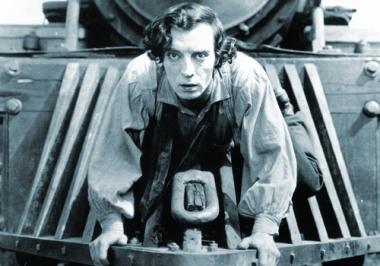There’s a famous story about Buster Keaton that sums up a lot of his knockabout life in vaudeville and Hollywood. It takes place during the filming of Sherlock, Jr. (now recognized as a groundbreaking marvel, it was a bit of a flop in its day), in a scene where Keaton finds himself dangling from the feed tube of a steam railway’s water tower.
Though the gag went as planned—the water came rushing out, throwing him to the tracks below—Keaton had underestimated the sheer force the flow would produce, and complained afterward that the impact left him with a day-long headache. Eleven years passed before a doctor, looking over some of the actor’s X-rays, asked, “When did you break your neck?”
Keaton, battered and bruised from years of physical comedy, had simply lived with the fracture, oblivious.
That dedication to craft will be on display this weekend, when Shelburne Falls’ Pothole Pictures kicks off its 2010 season with a special screening of Keaton’s classic The General, with an original score performed live by electric cellist (and former Valley resident) Gideon Freudmann, whose real-time looping gear lets him sound like a full, if delightedly off-kilter, orchestra.
The 1927 picture—remarkably, it’s based on a true story—is set during the Civil War, and stars Keaton as Johnnie Gray, a Confederate engineer who loves his train (The General) only slightly less than he does the comely Annabelle Lee. When both are kidnapped by Union soldiers, Johnnie mounts a one-man rescue mission, giving Keaton—who, despite that broken neck, had a lifelong love affair with the rails—a canvas for some of his best work. It screens Friday, May 7 and Saturday May 8 at 7:30 p.m. at Memorial Hall in Shelburne Falls; arrive at 7 p.m. for pre-screening concerts by local musicians.
*
The music rolls on this week as the WFCR Jazz Series continues at Amherst Cinema on May 11, with series host and radio personality Tom Reney introducing Round Midnight in a 7 p.m. screening.
Starring real-life jazz legend Dexter Gordon as the fictional tenor sax player Dale Turner, the film, directed by Bertrand Tavernier, follows the alcoholic Turner from 1950s New York to Paris, where he discovers a respect for his music—and himself—that isn’t tied to the color of his skin.
With an Oscar-winning score from Herbie Hancock, Round Midnight is the rare music film that doesn’t belittle its own material. Like all the films in the Jazz Series, it will be preceded by a short concert of live jazz and followed by a discussion about the music, its history, and the musicians who made both.
Jack Brown can be reached at cinemadope@gmail.com.



